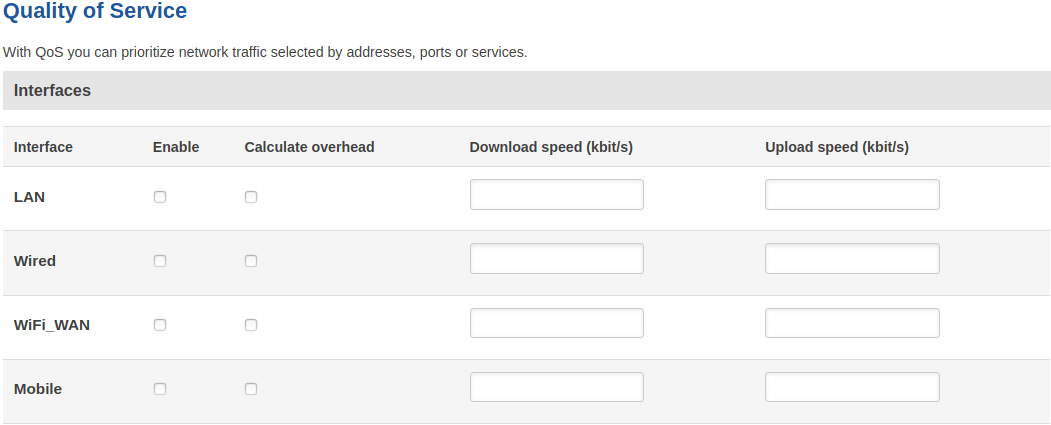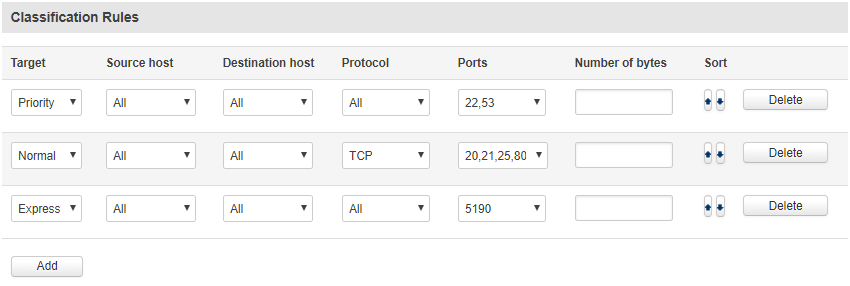RUT900 QoS: Difference between revisions
| Line 63: | Line 63: | ||
[[Image:Services qos classification rules.PNG]] | [[Image:Services qos classification rules.PNG]] | ||
<table class="nd-mantable"> | |||
<tr> | |||
<th>field name</th> | |||
<th>value</th> | |||
<th>description</th> | |||
</tr> | |||
<tr> | |||
<td>Target</td> | |||
<td>Priority {{!}} Express {{!}} Normal {{!}} Low; Default: '''WAN'''</td> | |||
<td>Target for which the rule will be applied</td> | |||
</tr> | |||
<tr> | |||
<td>Source host</td> | |||
<td>All {{!}} ip; Default: '''All'''</td> | |||
<td>Host from which data will be transmitted</td> | |||
</tr> | |||
<tr> | |||
<td>Destination host</td> | |||
<td>All {{!}} ip; Default: '''All'''</td> | |||
<td>Host to which data will be transmitted</td> | |||
</tr> | |||
<tr> | |||
<td>Protocol</td> | |||
<td>All {{!}} TCP {{!}} UDP {{!}} ICMP {{!}} -- custom --; Default: '''All'''</td> | |||
<td>Data transmission protocol</td> | |||
</tr> | |||
<tr> | |||
<td>Ports</td> | |||
<td>All {{!}} integer [0..65535]; Default: '''22,53'''</td> | |||
<td>Port(s) that will be used for transmission. You can enter multiple ports by separating them by commas (',')</td> | |||
</tr> | |||
<tr> | |||
<td>Number of bytes</td> | |||
<td>integer; Default: " "</td> | |||
<td>The maximum number of bytes for the connection</td> | |||
</tr> | |||
</table> | |||
Revision as of 15:14, 17 December 2018
Main Page > EOL Products > RUT900 > RUT900 Manual > RUT900 WebUI > RUT900 Services section > RUT900 QoSSummary
With QoS you can prioritize network traffic selected by addresses, ports or services. This chapter is an overview of the QoS function in RUT routers.
General settings and Interfaces
The General settings section is used to enable or disable all QoS functionality and the Interfaces section allows you to set up bandwidth limits for specified network interfaces.
| GENERAL SETTINGS | ||
| field name | value | description |
|---|---|---|
| Enable | yes | no; Default: no | Toggles QoS functionality ON or OFF |
| INTERFACES | ||
| Interface | WAN | LAN | PPP; Default: WAN | Interface that the rule applies to |
| Enable | yes | no; Default: no | Toggles the rule ON or OFF |
| Calculate overhead | yes | no; Default: no | Decreases upload and download ratio to prevent link saturation |
| Half-duplex | es | no; Default: no | Enables data transmission in both directions on a single carrier |
| Download speed (kbit/s) | integer; Default: 1024 | Specifies maximum download speed for the specified interface |
| Upload speed (kbit/s) | integer; Default: 128 | Specifies maximum upload speed for the specified interface |
Classification Rules
| field name | value | description |
|---|---|---|
| Target | Priority | Express | Normal | Low; Default: WAN | Target for which the rule will be applied |
| Source host | All | ip; Default: All | Host from which data will be transmitted |
| Destination host | All | ip; Default: All | Host to which data will be transmitted |
| Protocol | All | TCP | UDP | ICMP | -- custom --; Default: All | Data transmission protocol |
| Ports | All | integer [0..65535]; Default: 22,53 | Port(s) that will be used for transmission. You can enter multiple ports by separating them by commas (',') |
| Number of bytes | integer; Default: " " | The maximum number of bytes for the connection |


